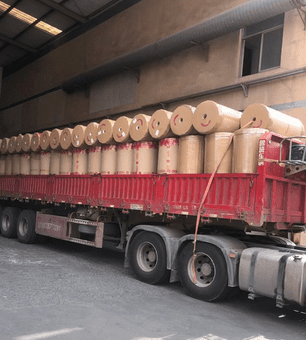The Environmental Impact of Thermal Paper Jumbo Rolls India Purchases
- Raghav jain
- Aug 21, 2024
- 3 min read

As businesses in India increasingly turn to thermal paper jumbo rolls for their printing needs, it's essential to consider the environmental impact of these products. Thermal paper, widely used for receipts, labels, and tickets, offers convenience and efficiency, but it also presents environmental challenges that need to be addressed. In this article, we will explore the environmental impact of thermal paper jumbo rolls in India, focusing on the ecological footprint and potential solutions to mitigate these effects.
1. Understanding Thermal Paper
Thermal paper is a type of specialty paper coated with a heat-sensitive material that changes color when exposed to heat. This process eliminates the need for ink, making it a popular choice for receipt printers, barcode labels, and more. In India, the demand for thermal paper jumbo rolls is significant due to the growing retail and service sectors. However, the environmental implications of these products are not always immediately apparent.
2. Chemical Concerns
One of the primary environmental concerns associated with thermal paper jumbo rolls in India is the use of harmful chemicals. Traditional thermal paper contains bisphenol A (BPA) or bisphenol S (BPS), both of which are endocrine disruptors. BPA, in particular, has been linked to various health issues, including reproductive problems and cancer. When thermal paper is disposed of, these chemicals can leach into the soil and water, posing a risk to both human health and the environment.
3. Waste Generation
Thermal paper is typically used for single-use applications, such as receipts and labels, which contribute to significant waste generation. In India, where waste management infrastructure is still developing, the disposal of large quantities of thermal paper can strain existing systems. This contributes to landfill overflow and increases the burden on waste processing facilities. Moreover, thermal paper often cannot be recycled due to its coating, exacerbating the waste problem.
4. Sustainability Challenges
The production process of thermal paper jumbo rolls also has environmental implications. Manufacturing involves the use of energy and raw materials, contributing to carbon emissions and resource depletion. The paper itself is derived from wood pulp, raising concerns about deforestation and habitat destruction. Additionally, the chemicals used in thermal paper production can pollute water sources and affect local ecosystems.
5. The Push for Eco-Friendly Alternatives
In response to these environmental concerns, there is a growing push towards eco-friendly alternatives to traditional thermal paper. Many thermal paper jumbo rolls manufacturers in India are now offering BPA-free and BPS-free options. These alternatives use safer chemicals and are designed to minimize environmental impact. Additionally, some manufacturers are exploring the use of recycled materials and environmentally friendly coatings to further reduce the ecological footprint.
6. Implementing Best Practices
Businesses in India can take several steps to mitigate the environmental impact of their thermal paper purchases. Here are some best practices:
Opt for BPA-Free Thermal Paper: Choose thermal paper products that are free from harmful chemicals like BPA and BPS. Look for certifications and labels that indicate eco-friendly and safer alternatives.
Minimize Usage: Reduce the amount of thermal paper used by adopting digital receipts and electronic records. Encouraging customers to opt for electronic receipts can significantly cut down on paper waste.
Promote Recycling: Although traditional thermal paper is not easily recyclable, some companies are developing recycling solutions. Support initiatives and programs that focus on recycling or repurposing thermal paper.
Support Sustainable Brands: Purchase thermal paper from manufacturers that prioritize sustainability in their production processes. Look for companies that use recycled materials and environmentally friendly practices.
7. Regulatory Measures and Industry Standards
The Indian government and industry bodies are increasingly recognizing the need for environmental responsibility in the thermal paper sector. Regulations and standards are being developed to address the use of harmful chemicals and promote sustainable practices. Staying informed about these regulations and supporting compliance can help drive positive change within the industry.
8. Consumer Awareness and Advocacy
Raising awareness about the environmental impact of thermal paper jumbo rolls is crucial for driving change. Businesses and consumers alike should advocate for more sustainable practices and support products that align with environmental goals. Educating stakeholders about the benefits of eco-friendly thermal paper can encourage widespread adoption of safer alternatives.
Read also this article: Customizing Thermal Paper Jumbo Rolls Wholesale: What You Need to Know
Conclusion
The environmental impact of thermal paper jumbo rolls India is a pressing issue that requires attention from both manufacturers and consumers. From chemical concerns and waste generation to sustainability challenges, the production and use of thermal paper present significant ecological challenges. However, by embracing eco-friendly alternatives, implementing best practices, and supporting regulatory measures, we can work towards reducing the environmental footprint of thermal paper products. As the industry evolves, it is crucial to prioritize sustainability and make informed choices that benefit both the environment and public health.
4o mini



Comments